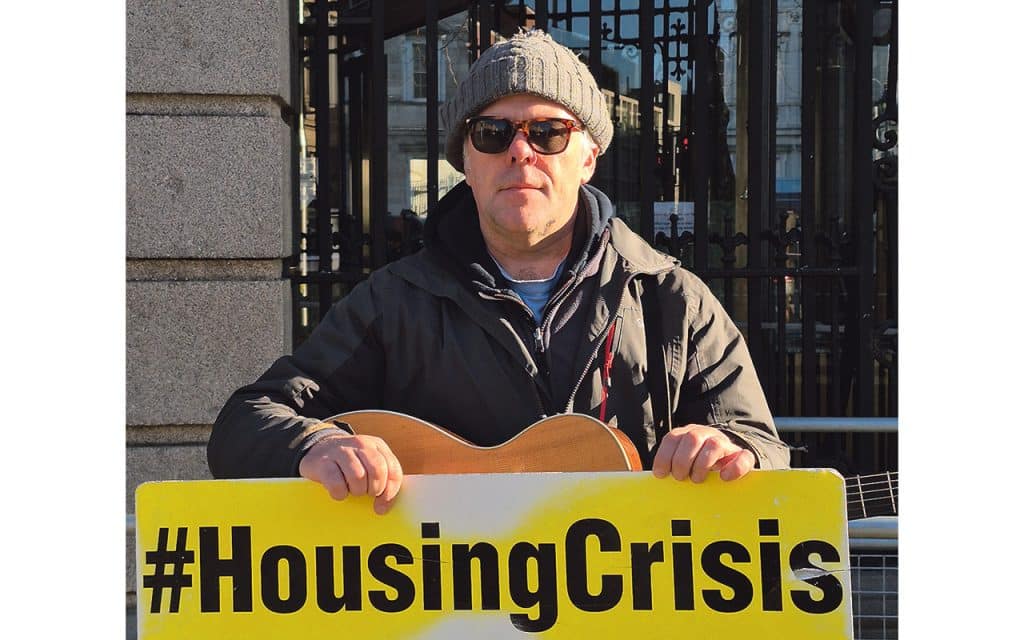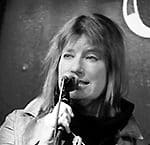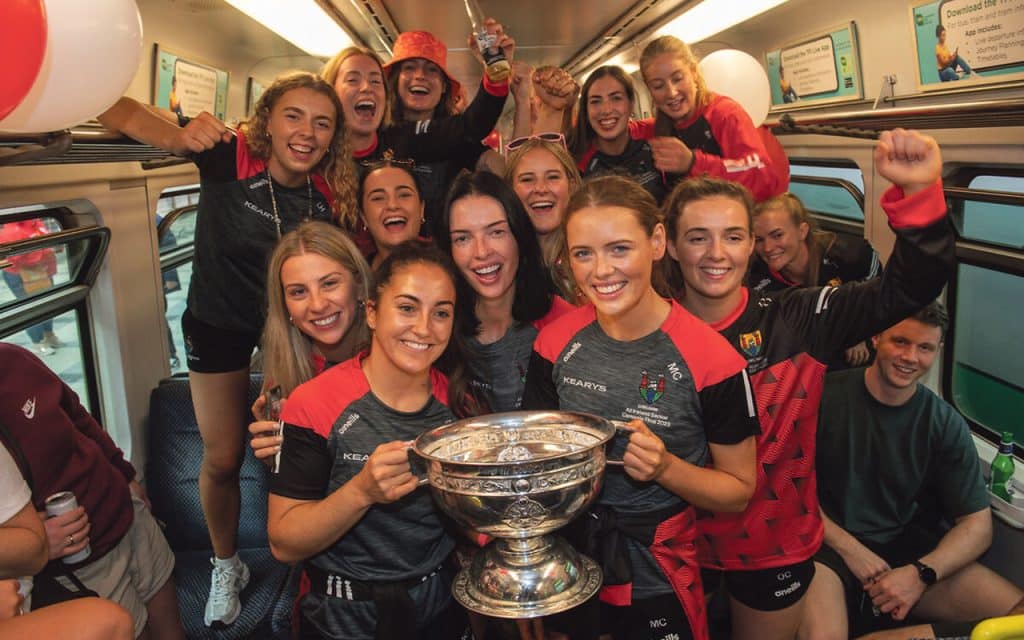
It’s May 2025. The sky is grey. A singer stands under a porch in Bandon. His hands move masterly across the neck and body of his guitar. Chords well-played. But it’s the sound, the melody and the soaring lyrics of his song that give it wings and lift it above the ordinary. A relatively small but very appreciative audience bursts into applause after he finishes on a final and decisive chord. Anyone who knows anything about music will recognise that this self-assured performance wouldn’t be out of place on a large festival stage. The song has all the hallmarks of a hit. From the eloquent and measured opening lines to the rousing, repeated but not repetitive chorus at the end. Not to mention that hard-to-define quality in the man’s voice that touches people’s hearts and souls. Especially during this weekly ‘Vigil for Gaza’ – Sundays at 5pm on Bandon’s Main Street.
Yet not all passers-by in this public space are prepared to listen. Some hasten their step, cloaked in indifference. Stone-cold faces refuse to let his words sink in, as if to prove his words as he sings “Our universities, some of our great minds/Are silent on the genocide/Silence, silence. […] Our companies and our offices and our staffrooms and our board meetings/And somebody brings up Palestine and the genocide/Silence, silence. In the face of this atrocity/Silence is complicity.” Sung not with aggression or hatred but with an almost gentle passion. Inviting people to open their hearts.
His name is Martin Leahy.
A multi-instrumentalist with an Irish traditional, as well as rock ‘n roll background, Leahy is an experienced musician, totally committed to his craft, who plays crowds of any size with equal intensity – whether there are 10 or tens of thousands in the audience. And he is no stranger to the latter. “My parents were encouraging us all to play music; my dad had a Country ‘n Irish band so I would have heard a lot of that stuff, growing up. I started out on the music scene in Cork as a drummer. My brother Christy played the traditional accordion and, when I was 18, I wound up joining his band on the snare drum.” Named North Cregg after an uilleann pipe tune referring to a small townland near Fermoy, it became quite successful internationally and played big folk festivals in places like Glastonbury, Milwaukee, Cambridge, Tønder Festival in Denmark, Celtic Connections in Glasgow.
In his 20s, Martin Leahy branched out into guitar, then bass, and became part of the fabric of many different bands. “As a kind of session musician, really. Then in my 30s I set up my own home studio, started recording albums for people and got into music production.”
A consummate professional, he remained in the background and didn’t attract a lot of attention to himself. “I never sang. I didn’t feel that I could do it. Even at a sound check, if somebody said, ‘Say Hello into that microphone to check it,’ I wouldn’t do it, as I was extremely self-conscious when it came to using my voice in public. At the same time, the people that I had really enjoyed listening to while growing up were singer-songwriters such as Woody Guthrie, Christy Moore, Sinéad O’Connor, Joni Mitchell. And deep down I felt that I, too, had something to express.”
He confesses that he always sang at home to himself. But only during COVID did he fine-tune his vocals to the extent that he felt more confident about publishing one of his own songs ‘Where We Lay Our Bodies Down’ (for Ann Lovett) on on video,. “She was a 15-year-old schoolgirl in 1984 when she gave birth to a son beside a grotto in the village of Granard (Co Longford), where she lived. The baby was found dead and she died soon afterwards. It shook the country in many ways. There was so much shame and secrecy around what actually happened. It was mere months after a national referendum was voted down that aimed to recognise “the equal right to life of the pregnant woman and the unborn”. Ultimately, she’s responsible for a lot of change. It was the first song I put on YouTube under my own name. It got a good reaction, which was very encouraging. And then I just kept doing it. I had always been aware that using your voice was a way to shine a light on issues.”
In 2022, the issue of homelessness came sharply into focus for Martin Leahy when he received an eviction notice after his landlord decided to sell the house where he lived. He was inspired to write a song, ‘Everyone should have a home’ and decided to sing it (and other songs) outside the gates of the Dáil every Thursday for an hour. Audiences formed, journalists visited, teachers brought their students; sometimes other musicians or (opposition) politicians join in. In May, he marked the day that he had been doing this for three years straight. Not really a cause for ‘celebration’, as rents continue to spiral and homelessness is increasing at an accelerating rate. So, although he has now found another place to live, he will continue his weekly protest, regardless of the inconvenience of travelling to Dublin every week from West Cork. And notwithstanding the online mud that is thrown at him for being an outspoken activist. (He wrote a song about it ‘Snowflakes’, which has been covered by Christy Moore). It is a matter of principle: he cannot stand injustice. And he stays true to his word.
As a musician, Martin Leahy still sometimes plays the role of backing musician, for example for John Spillane on drums as a member of the Band of Wrens (July 3 in DeBarra’s Folk Club, Clonakilty). But he’ll also be featured as a singer-songwriter in his own right during the Clonakilty International Guitar Festival (September 17-21). Rightly so. The songs that he has written in the past years, driven by a sense of purpose, are excellent. Not just in the context of direct action and activism – music can be the glue that helps keep a movement together – but also as songs that can (and probably will) stand the test of time as they uphold underlying human values.
Martin Leahy’s music can be found on Bandcamp, Spotify and YouTube and at various (West) Cork events for Gaza (see www.ipsc.ie).



